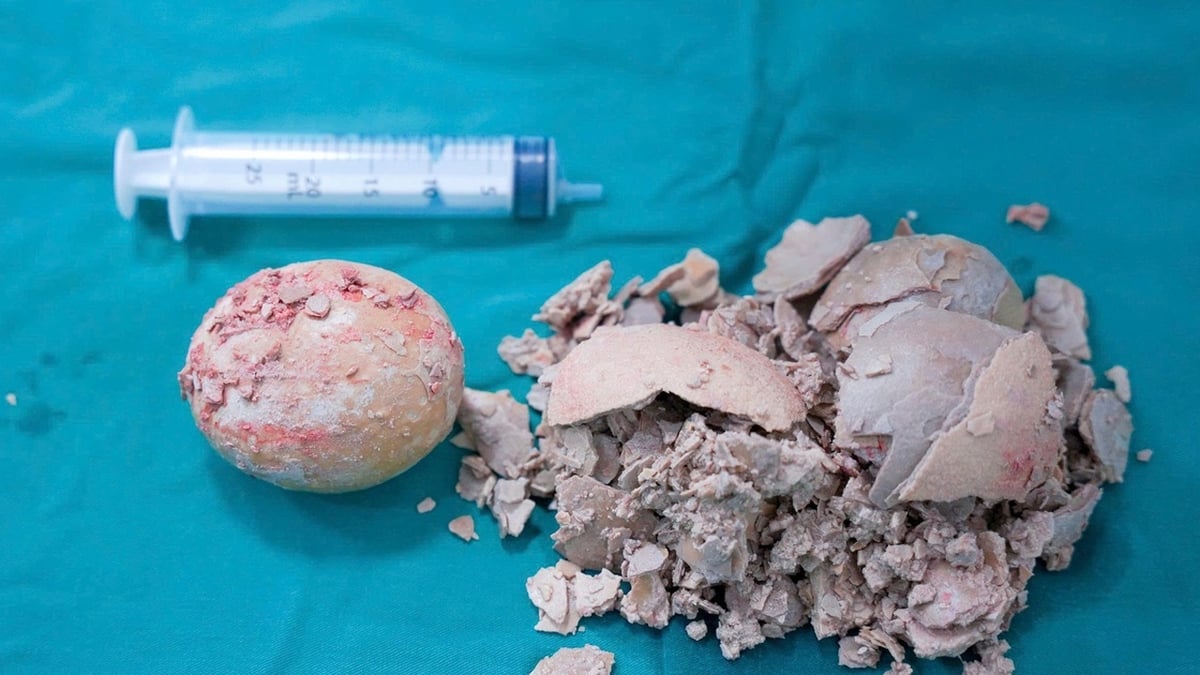SGGP
Recently, many cases of botulinum poisoning have been recorded, but the antidote for this toxin is very scarce. Many people are worried about the risk of botulinum poisoning because there are many processed foods of unknown origin and unsanitary conditions appearing on the market.
Neurotoxin
According to Dr. Le Quoc Hung, Head of the Department of Tropical Diseases, Cho Ray Hospital, botulinum bacteria live in anaerobic environments, meaning that they can only live in places with low oxygen concentrations. In a normal environment, botulinum cannot survive, but it transforms into spores (bacteria create a shell for it to "hibernate", at this time the bacteria are inactive but not dead) and are present everywhere around humans. These spores will become active again in an environment without oxygen, so all types of canned and sealed foods are favorable environments for botulinum spores to grow; and the possibility of people being poisoned by botulinum when using canned and sealed foods is still possible.
Sharing the same opinion, Dr. Nguyen Trung Nguyen, Director of the Poison Control Center, Bach Mai Hospital, said that food poisoning caused by botulinum toxin is a classic type of poisoning in medical literature, but in reality it does not occur often. The cause of this type of poisoning often comes from the production of food products in sealed packaging (bottles, jars, cans, boxes, bags) that do not ensure safety, leading to some types of bacteria growing and producing toxins that cause disease, such as botulinum bacteria (also known as meat poisoning bacteria because it initially occurred mainly with canned meat). This bacteria is anaerobic, only grows in an environment lacking air, cannot grow in an acidic environment (pH <4.6), salty (salt concentration >5%) environment. Thus, processed foods containing a few bacterial spores due to unsafe production processes, or after production, foods are packaged tightly but not acidic or salty enough, creating conditions for bacteria to grow and secrete botulinum toxin.
Be careful with long-term sealed foods.
To prevent the risk of botulinum poisoning, Dr. Le Quoc Hung recommends that when processing bottled, jarred or sealed foods, people need to clean the environment, wipe and clean the processing area regularly to avoid dust, soil, sand and harmful bacteria from sticking to the food. Food packaging should also apply modern techniques. Manufacturers often use sterilizing rays when packaging to ensure food safety, but people who package food at home are at high risk of food safety. "When packaging food, people should apply a salinity level of >5% (5gr of salt/100gr of food) because bacteria cannot grow in an environment that is too salty. In addition, be careful not to use expired food, especially canned products that are swollen or deformed, because these products have been attacked by botulinum bacteria or other bacteria," Dr. Le Quoc Hung informed.
 |
It is necessary to choose processed foods with clear origin and quality safety certification. Photo: HOANG HUNG |
From the perspective of the management agency, Mr. Nguyen Hung Long, Deputy Director of the Department of Food Safety ( Ministry of Health ), said that bacteria that produce botulinum toxin are common in many places, especially in the soil, so the risk of contamination in food is very high. This is a very dangerous toxin in food and has the strongest toxicity, a dose of only 1.3-2.1 nanograms can cause death. However, if botulinum is at a temperature of 1000C for 10 minutes, it will decompose. This proves that if food is unfortunately contaminated with botulium toxin and is boiled for at least 10 minutes, the toxin will be completely eliminated. According to Dr. Nguyen Trung Nguyen, people need to choose products with clear origins, recognized quality and safety standards; be careful with sealed foods and should not self-package foods for long periods of time in non-frozen conditions; Give priority to eating freshly prepared, freshly cooked foods.
On May 22, a representative of the Drug Administration (Ministry of Health ) said that they had contacted the importer, CPC1 Pharmaceutical Joint Stock Company, and Cho Ray Hospital had discussed with this company about ordering botulinum antidote. The importer had contacted the foreign supplier to complete the procedures to import this rare drug as soon as possible. At the same time, the Drug Administration contacted the World Health Organization (WHO), in case the drug could not be purchased, it would seek support from WHO... (MINH KHANG)
__________
Symptoms of botulinum poisoning
According to medical experts, botulinum is a very strong neurotoxin, so after eating contaminated food, botulinum is absorbed into the body, attaches to the nerves, and causes paralysis of all muscles. Symptoms of botulinum poisoning usually appear about 12-36 hours after eating. Patients show signs of paralysis in sequence starting from the head, face, and neck area (difficulty swallowing, sore throat, difficulty speaking, hoarseness, unable to open eyes), spreading to both arms (weak arms), then to both legs (weak legs), paralysis of respiratory muscles (wheezing, phlegm in the throat, difficulty breathing). When a patient has muscle paralysis, a specific antidote, botulinum toxin, is needed. The drug should be used as soon as possible to help shorten the time on a ventilator, the length of hospital stay, and reduce mortality.
Source



















































![[Maritime News] More than 80% of global container shipping capacity is in the hands of MSC and major shipping alliances](https://vphoto.vietnam.vn/thumb/402x226/vietnam/resource/IMAGE/2025/7/16/6b4d586c984b4cbf8c5680352b9eaeb0)













































Comment (0)